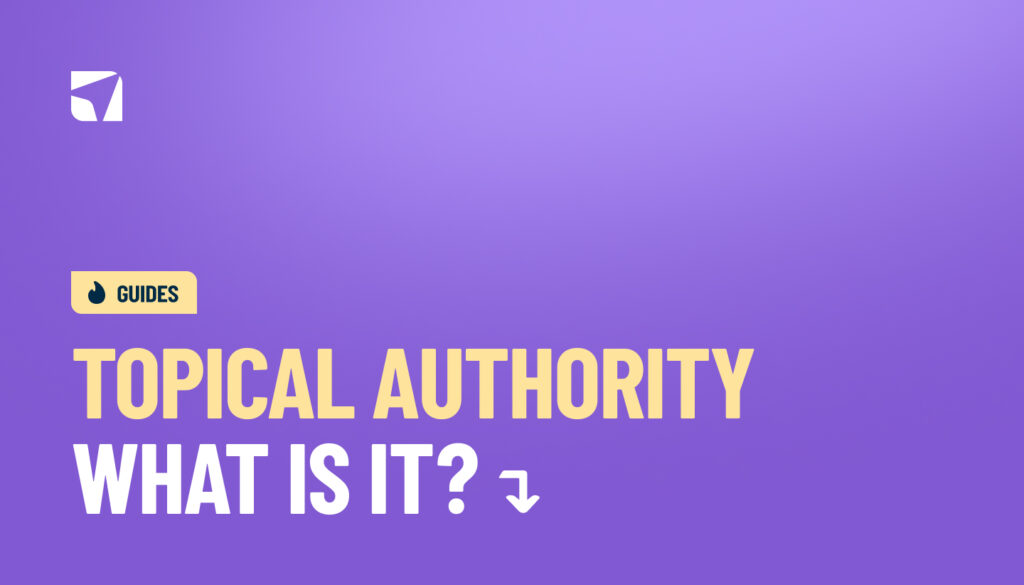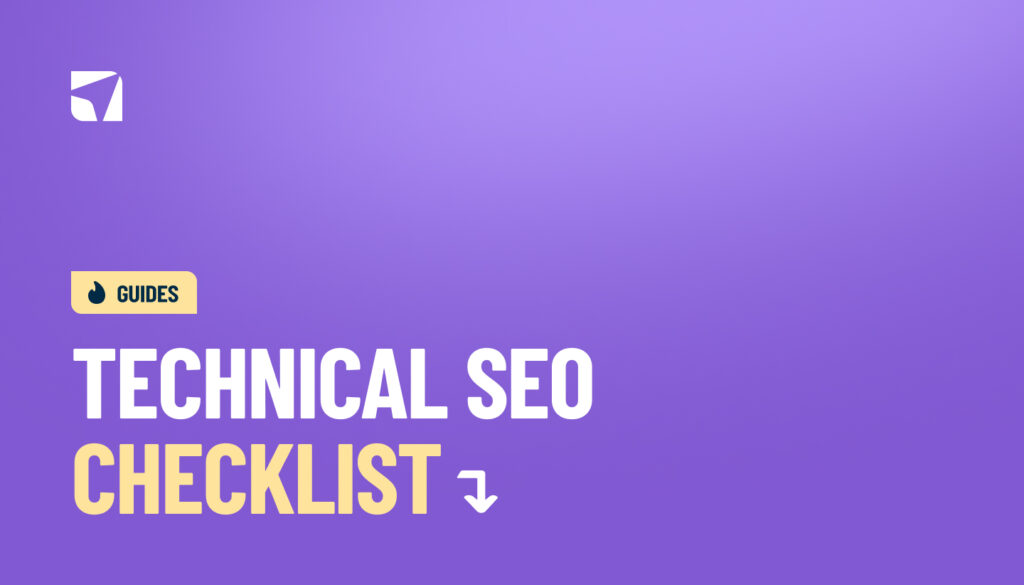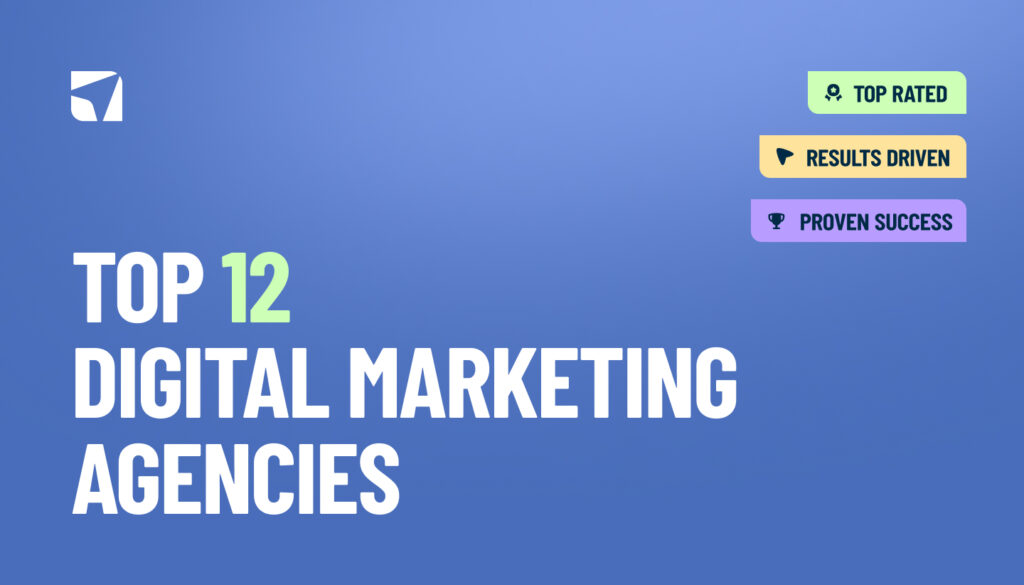Did you know that 95% of content never receives any traffic from Google? That’s zero organic clicks, despite all the time and effort spent writing and publishing.
It’s a common frustration: you’re consistently creating high-quality blog posts, following SEO best practices, and yet… rankings barely budge, if at all. The truth is, SEO success today isn’t just about individual blog posts.
Search engines are sophisticated and are more capable than ever when it comes to determining the quality and relevance of the content you put out. They don’t just look and what you say, but how deeply and consistently you cover a topic, prioritising websites that demonstrate comprehensive knowledge in specific subject areas.
This is where Topical Authority comes in.
Topical authority refers to your website’s perceived depth and credibility on a particular subject area. Instead of publishing scattered content across random topics that may or may not be related to your niche, websites that build strategic, in-depth content around a core theme are more likely to be rewarded in search results.
And in 2025? It’s one of the most powerful ways to improve your visibility and drive long-term organic traffic.
In this post, we’ll break down exactly what topical authority is, why it matters, and how you can build it, step by step, for real SEO success.
What is Topical Authority in SEO?
In simple terms, topical authority is Google’s way of measuring how well your website serves as a trusted, comprehensive resource on a particular topic.
Topical authority is a key pillar of modern SEO, having gained momentum after Google’s Hummingbird update in 2013, which pushed the algorithm to focus more on semantic relationships and user intent, not just keywords. Since then, search engines have become far better at identifying content that genuinely answers user questions and demonstrates subject-matter expertise.
Google rewards websites that show consistent, high-quality coverage of a topic. But this doesn’t mean churning out dozens of surface-level articles. Instead, true topical authority is built on a few key elements:
- Depth and Comprehensiveness: Address the topic from every relevant angle. Think guides, FAQs, case studies, comparisons, and how-tos.
- Quality and Relevance: Write content that’s genuinely useful, accurate, and aligned with what users are searching for.
- Consistency: Regularly publish content within your chosen niche or topic cluster to strengthen your authority.
- Interconnectedness: Link related content together using internal links to form topic clusters, helping both users and search engines understand your site structure and focus.
The relationship between content quality and topical authority is cyclical. The more comprehensive and relevant your content, the more Google sees you as an authority. And the stronger your topical authority, the more likely your content is to rank well.
Topical Authority vs Domain Authority: What’s the Difference?
Many SEO discussions lump these concepts together, and while they do work together, topical authority and domain authority serve distinctly different purposes in SEO.
Domain Authority measures your website’s overall trustworthiness in specific areas. It takes years to develop and is influenced by factors like backlinks, domain age, and site reputation. It offers a general sense of how strong your site is, but doesn’t tell you how well you rank for a particular topic.
On the other hand, topical authority focuses on your expertise within a specific subject area. You might have a relatively low domain authority, but still outrank big-name competitors for a niche topic if you’ve published high-quality, focused content around it.
For new websites, focusing on building topical authority first in a specific sub-niche can be a game-changer. By narrowing your focus and building rich, interconnected content around a core topic, you can start ranking and building visibility without needing years of backlink accumulation. Over time, as your topical authority grows, so does your overall domain strength, especially as others begin to link to your valuable content.
Why It Matters More Than Ever
For websites aiming to improve their visibility, attract more organic traffic, and convert visitors into loyal customers, building topical authority is a must-have strategy.
But why? Well, search engines are smarter than ever. Just look at the rise of AI Overviews and entity-based search. They want to give users the best of the best information and that means providing content from sources that have clearly demonstrated expertise and trustworthiness on a given subject.
✅And the benefits go far beyond rankings: Better user experience, stronger engagement, and more conversions often follow.
Depth Drives Discoverability
In the early days, surface-level blog posts could easily land you on page one – all you had to do was sprinkle in a few keywords, match the title to a common search phrase, and hit publish. Search engines weren’t as skilled at understanding depth or intent and relied on the content creator to signal relevance through basic on-page elements like keyword density and meta tags.
But today, content depth is a non-negotiable. Research shows that websites with strong topical authority see traffic growth 57% faster than those that lack it. Why? Because deep content signals expertise. Remember, you aren’t writing for robots. Your writing for people.
By thoroughly covering every angle of a topic, answering common questions, diving into subtopics, and offering unique insights, you prove your value to both users and search engines. In return, your chances of ranking for a broader set of related keywords grow significantly.
Quality Builds Trust
As a business or a brand, you want your audience to see you as a reliable source, someone they can turn to for accurate, helpful, and insightful information, and, ultimately, what you offer (whether that is a product or service)
Including real-world experiences, expert opinions, and well-researched information helps your content resonate with readers while boosting your authority in Google’s eyes. Trustworthy content leads to more returning visitors, and better long-term rankings.
Consistency Strengthens Authority
Publishing one good article isn’t enough. Consistency is what transforms content into authority. Regularly adding new content that supports and expands on your existing themes shows Google that you’re committed to your niche.
A steady stream of valuable, on-topic content makes it easier to rank future posts. Over time, it creates a compounding effect; each new article reinforces your expertise and strengthens your presence across search results. Don’t forget internal linking!
Internal Linking Builds Structure (and Strength)
One of the most overlooked elements of topical authority is internal linking. By connecting related articles and pages, you help both users and search engines navigate your content more effectively. This strategy, known as creating topic clusters, tells search engines that you’re providing comprehensive coverage of a subject.
A solid internal linking structure distributes page authority, improves crawlability, and reinforces your credibility in a specific area. For users, it creates a smoother journey through your content. For SEO, it builds a clearer picture of what your site is really about.
External Linking Enhances Credibility
While internal links help structure your own site, external links support your authority in the wider web. Linking to credible, relevant sources shows that your content is well-researched and connected to other trusted information online.
Even more powerful? Earning backlinks from respected sites in your niche. When others cite your work, it reinforces your expertise and increases your authority in Google’s ranking system. These links are often a natural byproduct of high-quality content, and they amplify your visibility even further.
How Google Understands Topical Relevance
You’ve likely heard that a lot goes into the process of how Google determines what pages and articles are the most relevant to a user’s query. Considering there are over 200 ranking factors, it’s no surprise that the algorithm is constantly evolving.
Today, it uses advanced semantic analysis to understand not just what users are searching for, but why, and how well the content it serves delivers on that intent. Instead of relying solely on keywords, Google evaluates context, relationships between topics, and the overall quality and credibility of your content.
1. Semantic Search & User Intent
Semantic search focuses on meaning and context rather than exact keyword matches. This allows Google to identify relevant content even if the search terms aren’t word-for-word in your copy. When this is combined with a thorough understanding of user intent, Google aims to deliver content that genuinely answers what a searcher is looking for, not just what they typed.
For example, if someone searches for “how to keep my house cool without air conditioning,” Google may surface articles that use phrases like “natural ways to cool your home,” “beat the heat without AC,” or “eco-friendly cooling tips.” Even though the exact words from the query aren’t used, Google understands that the content is contextually relevant and satisfies the user’s intent.
2. Content Quality & Coverage
Google analyses the “depth and breadth” of your content by evaluating the keywords, phrases, and subtopics you include. A page that thoroughly explores a topic by answering common questions, providing insights, and covering related angles has a better chance of being seen as topically relevant.
3. E-E-A-T: Experience, Expertise, Authority, and Trust
Topical relevance is also influenced by how trustworthy and authoritative your content appears. Google’s E-E-A-T (Experience, Expertise, Authoritativeness, and Trustworthiness) guidelines assess the experience behind the content, the expertise of the author, the authority of your site, and the overall trustworthiness of your information.
The stronger your E-E-A-T signals, the more likely Google is to trust your content on that topic. This goes back to Google’s fundamental goal of providing users with reliable and accurate information, especially for topics that impact health, finance, safety, or other areas where credibility is critical.
4. Backlinks from Topically Relevant Sources
We’ve said it before and we’ll say it again…Not all backlinks are created equal. Google weighs backlinks from authoritative websites within your niche more heavily than links from unrelated sources. These backlinks tell Google that your content is respected and relevant within your subject area and is more likely to serve it to searchers.
5. Internal Linking & Site Structure
Your website’s internal structure matters more than you might think. Beyond helping readers explore your site and find the information they’re looking for, a clear hierarchy and strong internal linking strategy help Google understand how your pages relate to one another. Well-connected clusters of content around specific topics reinforce your site’s expertise and help distribute authority (See “link juice”) throughout your website.
6. Anchor Text Signals
The text used in hyperlinks, known as anchor text, provides additional context to both users and search engines. When relevant, descriptive anchor text is used to link related pieces of content, it strengthens the perceived connection between those pages and reinforces topical alignment.
7. Topic-Sensitive PageRank
Google’s traditional PageRank algorithm measures the importance of a webpage based on the quantity and quality of links pointing to it. However, Topic-Sensitive PageRank takes this a step further by factoring in the relevance of those links to a specific topic. Instead of just counting links, it gives more weight to backlinks from pages that are topically related to your content.
For example, if your website is about eco-friendly gardening, a backlink from a popular sustainable living blog will carry more weight than a link from an unrelated site, like a tech gadget review blog. This helps Google understand not only how popular your page is, but also how relevant and authoritative it is within your niche.
How to Build Topical Authority for Your Website
Building topical authority requires a strategic, focused approach. After all, you want to truly demonstrate your expertise to both users and search engines.
Success comes from creating deep, meaningful content around related subjects that you are passionate about and experienced in. So, here’s an overview of how to approach it:
- Niche Selection: Focus on specific subcategories where you can truly add unique value. For example, instead of trying to be an authority on the entire knitting industry, become the go-to expert for knitting patterns. This targeted focus makes it easier to build authority and attract the right audience.
- Content Depth and Breadth: Cover a broad range of related subjects within your niche while diving deep into individual topics. This comprehensive approach signals your expertise across the entire field, answering more user questions and covering all angles.
- Topic Clusters: Organise your content into pillar pages, comprehensive guides on broad topics, and support them with subtopic pages that explore specific aspects. This structure helps search engines understand how your content pieces relate and reinforces your topical expertise.
- Content Quality: Prioritise creating content that solves real problems and delivers value through original insights, expert perspectives, and research your competitors can’t match. Quality content builds trust and keeps visitors coming back.
- Strategic Linking: Establish a strong internal linking system connecting related pages, and earn external backlinks from authoritative sources within your niche. These links strengthen your topical relevance and boost your SEO.
1. Define Your Goal
First things first, what’s your primary goal? Are you aiming to increase brand awareness, attract new customers, generate leads, or establish yourself as an industry thought leader? Your end goal shapes everything, from the keywords you target to the content formats you use. Without a goal, you’re just publishing content.
For instance, if your goal is lead generation, your content might include in-depth guides with calls to action encouraging users to book consultations or to download an external source (like an e-book or a PDF)
2. Choose Your Niche
Topical authority starts with focus. You can’t be an expert on everything, but you can become the expert on something specific. This is a specific segment where you can showcase complete expertise. Instead of trying to cover everything broadly, focus on a specialised area where you can add unique value.
For example, rather than targeting the broad field of “fitness,” you might narrow down to “strength training”, “Fitness for beginners” or “Fitness techniques you should consider” This sharp focus makes it easier to become the trusted voice your audience turns to.
3. Audience Research
To write content that matters, you need to know who you’re writing for. To get to know your audience better:
- Analyse existing data from Google Analytics, social media insights, or your CRM.
- Conduct surveys or interviews with current customers to discover their pain points.
- Study competitors’ content to identify gaps or successful themes.
- Monitor social media and forums to uncover frequently asked questions and trending topics.
Understanding who they are, what challenges they face, and what solutions they’re looking for will guide your content creation.
4. Keyword Research
Knowing your audience and goals are one thing, but knowing what users are searching for is just as important. Keyword research reveals the exact language your audience uses, the questions they’re asking, and the intent behind their searches—giving you the insights you need to create content that actually gets found, clicked, and converts.
Use keyword research tools like:
- Semrush: Known for accurate search volumes and extensive data.
- Ahrefs: Great for assessing keyword difficulty and competitor analysis.
- Google Keyword Planner: Useful for PPC campaigns and forecasting.
- Wikipedia: A surprising but rich resource since Google uses its data for semantic understanding.
For blogs and articles, focus on identifying long-tail keywords; more specific phrases with less competition. For example, instead of “best coffee maker,” use “best mini coffee makers for small kitchens.” This shows detailed knowledge and targets highly motivated searchers.
You can also look for semantic relationships by exploring “People Also Ask” and related searches on Google. These offer connections between topics and help you build content clusters.
Avoid keyword cannibalisation, where multiple pages compete for the same keyword. By mapping keywords carefully and assigning unique primary keywords to each page, you ensure each page has a clear focus, improves its chances of ranking, and supports a stronger, more strategic site structure.
5. Map Out Topic Clusters and Pillar Pages
Topic clusters are groups of related pages that cover a topic completely. They connect a main pillar page with supporting cluster content. This structure builds the foundation of topical authority.
- Pillar pages work as complete guides that cover broad topics and target competitive keywords. They give readers a full overview and link to multiple cluster pages. This creates a content ecosystem that shows your expertise to search engines.
- Cluster pages explore deeply into specific subtopics related to pillar content. They target long-tail keywords and answer specific questions. Each cluster page links back to the pillar to create an interconnected web of content that strengthens topical relevance.
- Content hubs expand on this model by organising extensive collections of interlinked resources like glossaries, videos, or guides, further enhancing topical authority.
6. Create High-Quality, In-depth Content
Google doesn’t just want content, it wants valuable content. If you want to stand out, your content needs to be genuinely useful, deeply insightful, and perfectly aligned with what people are searching for.
Start by understanding user intent. Analyse what’s already ranking for your target keyword — is it a how-to guide, a product comparison, or a case study? Mirror the format that works, then do it better.
Example: If “best running shoes” surfaces in-depth comparisons with pros and cons, don’t just write a list; do it better by creating the most comprehensive, helpful breakdown online. Consider sizes, price comparisons, and what performs best in various conditions.
Use “People Also Ask” boxes, forum threads, customer emails, and search suggestions to uncover real questions your audience is asking. Then, bake those answers directly into your content or create dedicated FAQ sections and articles around them. It’s a powerful way to boost relevance and visibility.
Anyone can regurgitate generic information. To build real authority, your content needs originality, insight, and substance. Apply E-E-A-T principles (Experience, Expertise, Authoritativeness, Trustworthiness) by showing your unique expertise and adding depth by including:
- Expert quotes or interviews
- Original research or case studies
- First-hand experiences or personal insights
- Innovative solutions or methodologies
- Add original photos
- Share insider tips
- Back claims with credible sources.
An important factor to consider is that not everyone consumes content the same way. To maximise reach and impact, repurpose your insights across multiple formats:
- Blog articles
- Videos and reels
- Podcasts
- Infographics
- Tools or templates
Regularly update and expand your content. Brands that refresh content often see improved engagement and rankings. Revise older posts with new data and trends to stay relevant.
7. Refresh Often or Get Left Behind
Topical authority isn’t a “set it and forget it” strategy. Content that ranks today can fade tomorrow if it’s outdated, irrelevant, or thin.
Make content updates part of your strategy:
- Add new stats, trends, or insights
- Improve clarity and UX
- Expand with new questions or examples
- Reoptimise for shifting search intent
Brands that keep their content fresh don’t just maintain rankings, they climb them too.
8. Authority Building Through Linking
Links are trust signals. When done right, internal and external linking can dramatically boost your visibility, relevance, and authority in Google’s eyes.
Strong internal linking ties your content together, helping search engines understand topic relationships and boosting rankings. Link related pages within your clusters, guiding users deeper into your site.
- Link related articles within the same content cluster
- Create pillar pages and support them with relevant subtopics
- Encourage longer site sessions with clear, natural pathways
Beyond internal linking, building external backlinks from authoritative and relevant sites are one of the strongest ranking signals in SEO (and yet, 94% of online content earns zero backlinks!)
Use anchor text wisely: keep it brief, relevant, and varied. For example, mix branded terms (“YourSite.com”), naked URLs, generic phrases (“read more”), and exact or partial keywords carefully to avoid penalties.
9. Track Your Progress
You can’t improve what you don’t measure. Since topical authority isn’t a single metric, define clear goals like:
- Ranking for a percentage of niche keywords
- Increasing organic traffic by set amounts
- Growing backlink profiles from authoritative sources
Using tools like Google Analytics, Google Search Console, SEMrush, and Ahrefs can help you track keyword rankings, traffic, backlinks, engagement rates, and click-through rates. Use these insights to spot weak spots and double down on what’s working. Building topical authority is a marathon, not a sprint. With consistent tracking and strategic tweaks, your website will rise to the top and stay there.
Start Small. Rank Big.
Topical authority isn’t built overnight, but it is built one smart, strategic step at a time. By focusing on a clear niche, creating genuinely helpful content, and strengthening your internal and external links, you’re laying the foundation for long-term SEO success.
Keep in mind, every article you publish is a building block that brings your website closer to becoming the go-to resource in your space. So don’t be discouraged by the scale of the task, just start. Stay consistent, stay curious, and keep refining your strategy. With time and commitment, you won’t just compete, you’ll lead.
Need a little help, or don’t know where to start? That’s what we’re here for. At Digital Nomads HQ, we have a team of SEO Experts that live and breathe content strategy, keyword mapping, and performance-driven optimisation. We know what it takes to get you ranking and can help you get there, all you have to do is reach out! Get started today and take your content from invisible to unmissable.


















